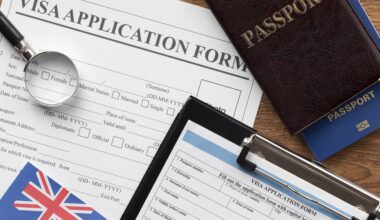For many Nigerians dreaming of “Japa,” the journey starts with a single, frustrating hurdle: the visa application. With embassies for popular destinations flooded with thousands of applications, rejection often feels less about your merit and more about sheer competition.
But what if the smartest move isn’t to fight the crowd, but to go where you’re genuinely needed and welcomed?
The truth is, numerous European nations—facing skill shortages and aging populations—are actively creating smoother, faster pathways for qualified Nigerian professionals, students, and entrepreneurs. These countries offer high visa approval rates, lower living costs, and a clear route to building a new life.
Drawing on 15 years of navigating global immigration, I’ve compiled this guide to 15 European countries where your Nigerian passport and skills are not a barrier, but an advantage.
Why Your “Japa” Strategy Needs to Evolve in 2026
The global talent map is shifting. While traditional destinations tighten belts, countries across Central and Eastern Europe are rolling out digital nomad visas, fast-track work permits, and generous post-study work rights to attract exactly the kind of talent Nigeria has in abundance.
Your success isn’t just about meeting requirements; it’s about strategy. Targeting a country that values your profile can turn a dream into a planned relocation.
You may also like: 5 Countries Actively Seeking Nigerian Skilled Workers
The 2026 List: Where to Focus Your Efforts
1. Poland: The EU’s Economic Engine
A powerhouse with a severe talent gap, especially in tech and healthcare.
-
Pathways: Work Permit (Type A/B) leading to a Temporary Residence Permit. Straightforward process for sponsored jobs.
-
Success Edge: High approval rates for skilled workers. A growing Nigerian community and lower EU living costs.
-
🔗 Official Source: Poland’s Official Immigration Portal
2. Hungary: Affordable Education & Welcoming Policies
Famous for the Stipendium Hungaricum scholarship funding 100+ Nigerian students yearly.
-
Pathways: Study visas, EU Blue Card, and a unique “White Card” for digital nomads.
-
Success Edge: Proactive in attracting international students. One of the EU’s lowest costs of living.
-
🔗 Official Source: Hungarian Immigration & Asylum Office
3. Czech Republic (Czechia): High Living Standards, Lower Costs
A stable, innovative economy hungry for engineers, IT specialists, and healthcare workers.
-
Pathways: The streamlined Employee Card (work & residence combo) or study visas for English-taught programs.
-
Success Edge: Efficient process, high quality of life, and central European location.
-
🔗 Official Source: Ministry of the Interior of the Czech Republic
4. Romania: The Tech Frontier
One of Europe’s fastest-growing tech hubs with booming demand for IT talent.
-
Pathways: Work visas for in-demand sectors, study visas (notably in medicine), and a digital nomad visa.
-
Success Edge: Low competition for visas, very affordable living, and an emerging market feel.
-
🔗 Official Source: Romanian Inspectorate General for Immigration
5. Bulgaria: Low-Cost EU Gateway
The EU’s most affordable member, perfect for students and entrepreneurs starting out.
-
Pathways: Student visas (popular for medicine), work permits, and startup visas.
-
Success Edge: Minimal bureaucracy for residency. Extremely low living costs free up capital for growth.
-
🔗 Official Source: Bulgarian Ministry of Foreign Affairs
6. Slovakia: The Heart of European Manufacturing
An automotive hub with a small population and a big need for skilled hands.
-
Pathways: Work permits, EU Blue Card, and visas for entrepreneurs.
-
Success Edge: Less application volume means more individual consideration. Stable, safe, and affordable.
-
🔗 Official Source: Slovak Embassy in Abuja
7. Lithuania: The “Baltic Silicon Valley.”
A digital nation with a famous Startup Visa and a push for foreign tech talent.
-
Pathways: Startup Visa, work visas, study programs, and a digital nomad visa.
-
Success Edge: Pro-innovation government. Streamlined processes for tech professionals and founders.
-
🔗 Official Source: Lithuanian Migration Department
8. Latvia: Addressing Labour Shortages Head-On
Actively easing rules to hire foreign workers in key sectors like IT and healthcare.
-
Pathways: Work visas, student visas, and investor residence options.
-
Success Edge: Government policy is shifting to actively welcome foreign workers to fill gaps.
-
🔗 Official Source: Office of Citizenship and Migration Affairs (OCMA)
9. Croatia: The Mediterranean Digital Nomad Hub
Recently joined Schengen and offers a coveted Digital Nomad Visa for remote workers.
-
Pathways: Digital Nomad Residence Permit, work visas, and study options.
-
Success Edge: Combines a stunning coastal lifestyle with a formal, tax-friendly pathway for remote professionals.
-
🔗 Official Source: Croatian Ministry of Interior
10. Greece: Sunshine & Streamlined Processes
Beyond tourism, Greece offers a Digital Nomad Visa and has historically favourable approval rates.
-
Pathways: Digital Nomad Visa, study visas, and pathways for investors.
-
Success Edge: Warm climate, rich culture, and a proven openness to legal residency applicants.
-
🔗 Official Source: Greek Ministry of Migration and Asylum
11. Cyprus: English-Speaking EU Education Hub
A major destination for African students, with universities actively recruiting internationally.
-
Pathways: Student visas are the primary, smooth-sailing route. Options for work and residency by investment exist.
-
Success Edge: High visa success for students. English is widely spoken, easing integration.
-
🔗 Official Source: Press and Information Office (Visas)
12. Serbia: The Flexible, Non-EU Option
Not in the EU, but it offers easy business registration and an e-residence system for entrepreneurs.
-
Pathways: Work visas, study visas, and a favourable environment for starting a business.
-
Success Edge: Less rigid immigration rules, very low cost of living, and a strategic Balkan location.
-
🔗 Official Source: Serbian Ministry of Foreign Affairs
13. Finland: The Nordic Need for Talent
Seeks to double its foreign workforce by 2030, with a fast-track visa for specialists.
-
Pathways: Work permits (with accelerated processing), renowned study programs, and a startup permit.
-
Success Edge: Exceptionally high visa approval for students (~99%). Transparent processes and high quality of life.
-
🔗 Official Source: Finnish Immigration Service
14. Ireland: The English-Speaking Tech Gateway
A booming economy with a 96-99% student visa approval rate for Nigerians and generous post-study work rights.
-
Pathways: Study visa (leading to Stamp 1G), Critical Skills Employment Permit, and entrepreneur programs.
-
Success Edge: Almost guaranteed visa success for genuine students. Direct path to work in Europe’s tech capital.
-
🔗 Official Source: Irish Immigration Service
15. Portugal: Europe’s Most Welcoming Climate
Consistently ranked as one of the easiest countries to immigrate to, with a high approval rate for Nigerians.
-
Pathways: Job Seeker Visa, D7 Passive Income Visa, work visas, and a vibrant startup ecosystem.
-
Success Edge: Famously welcoming culture, affordable Western European living, and multiple clear visa routes.
-
🔗 Official Source: Portuguese Agency for Integration, Migration and Asylum (AIMA)
Your Action Plan: From Scrolling to Relocating
-
Match Your Profile: Cross-check your skills or academic goals with each country’s “In-Demand” lists (linked in their official portals).
-
Gather Your Arsenal: Begin securing your international passport, academic transcripts, professional references, and proof of funds. Credential evaluations can take time—start now.
-
Network Strategically: Update your LinkedIn location to your target city. Use keywords like “relocating to [Country].” Connect with recruiters and Nigerians already there for insights.
-
Think Long-Term: Research not just the job market, but the lifestyle. Can you adapt to the climate and culture? A weekend of deep-dive research prevents years of regret.
The dream of “Japa” is more alive than ever, but the blueprint for 2025 requires savvy targeting. It’s about aligning your ambition with a country’s needs.
Which of these countries resonates most with your profile and goals? Share in the comments—let’s discuss your strategic next step.






